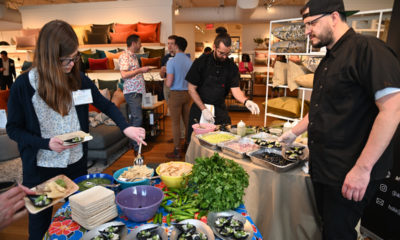Living
Confessions of a Pretty Lady
Sandra Bernhard on her live show, her comedic successors and the Prince cover she simply had to do

Sandra Bernhard
Saturday
8 p.m. (doors at 6)
Howard Theatre
620 T Street, NW
Thehowardtheatre.com
$35 advance, $40 door
By BRIAN WALMER

Sandra Bernhard brings her live show, an evening of stories and songs, to the Howard on Saturday night. (Photo courtesy of Roots Agency)
It’s a busy Monday afternoon for actress/comedian Sandra Bernhard when we talk.
“I’m dealing with lots of business stuff, tons and tons of stuff,” she says, her voice instantly recognizable.
Controversial, sexy, outspoken Bernhard has been a staple in the entertainment world for three decades and shows no signs of slowing down. She continues to appear on various TV shows and tours with her stage show, which is in Washington this weekend. Look for her Saturday night at the newly refurbished Howard Theatre.
In a sense, Bernhard, who’s been out for years, is not a typical comedian. She doesn’t just stand there telling joke after joke, waiting for the audience’s reaction. Instead, she engages the crowd with her views and takes on everything from politics to pop culture and weaves in a selection of songs that drive her point home.
Her current show, “I Love Being Me, Don’t You?,” debuted in 2011 and has evolved dramatically since then, a trend she credits to her constant wave of new ideas and her own boredom.
“Events occur and my life changes, things happen and I fold it in because I’m excited about telling a new story.”
Bernhard was here in 2008 for a three-week engagement at The Jewish Community Center for the 20th anniversary of “Without You I’m Nothing,” a show that helped put her on the map in the late ‘80s.
“It’s always interesting to look back and have a different perspective on what was going on at the time. Bring it into modern day. You of course have to alter it for what’s going on. A lot of it still holds up so I think that’s a great thing.”
She says D.C. audiences are more open minded than other markets.
“Actually I think they’re more informed, that makes them more open minded,” she says. “The last time I played D.C. was that long run at The JCC, so I assume that was sort of the general audience. They were relatively informed and smart as one would expect in D.C. They seemed to be into it. At the same time longing for entertainment, because I’m sure it’s tedious being in that city with all the politics and stuff. I really enjoyed performing there.”
Of her trademark out-of-left-field covers, which previously have included acts as far ranging as Nina Simone to Bob Dylan, AC/DC to Prince, she says she starts with the lyrics.
“It’s always a song that has a great story, lyric that resonates even if it at first it seems kinda hokey or over the top,” she says. “Like a hair metal song. It’s just like a song that I can tap into the emotion and turn it into something sorta different and that’s kinda the criteria for what I do.”
And, as one might expect, with Bernhard, it’s about much more than simply singing a song. One thinks of her recent take on Lady Gaga’s “The Edge of Glory,” which elicits an “exactly” from the comedian.
“You gotta really give the audience what they came to see and what they pay for,” she says. “And never make fun of a song. I don’t like making fun of songs even if they’re sort of laced with irony and I’m bringing something very different to them.”
Later this month, Bernhard will be at Carnegie Hall for a Prince tribute.
“As you know, ‘Little Red Corvette’ is kinda my signature song and when I read about it I called my manager and said, ‘You gotta get me on this, I mean this is insane, this is like my signature song, nobody else can do this,’ so when it all came together I was very excited.”
The mix of comedy and music is more unusual in the performing world than you might initially think. Along the way, Bernhard has recorded four albums of music. She says she’d love to do another studio album and would “love to collaborate with a great producer. But you know you need money and need support and I don’t really have that right now, but I hope I do again. In the meantime at least when people come see me perform, they know I’m in the pocket.”
The day of our phone chat is the Monday after the Grammys, which Bernhard said she watched just enough of “to know it was really depressing.”
Why?
“The music business is so [pauses] it’ll never be what it was,” she says. “[The Grammys] tries to keep this illusion alive and it just doesn’t work anymore.”
But with the paradigm shift has come certain freedoms, Bernhard suggests. She maintains a level of control that would be harder to ensure at a major label. Despite the constantly evolving nature of her tour, she says her various live releases still manage to capture enough of each show she does to keep her happy. Look for a release culled from a five-night run she did at Joe’s Pub in New York last year “soon,” she says.
Since Bernhard gets asked constantly about Madonna — everyone remembers her famous cameo in “Truth or Dare” — we took a different route. Of Cyndi Lauper, whom Bernhard joined for a few dates on the singer’s 2006 “Body Acoustic Tour,” she waxes nostalgic with no apparent subtext.
“She’s a great talent and it was fun and interesting,” Bernhard says. “I didn’t do that many shows; it was just the right amount. We knew each other and she needed some support out on the road and they asked if I wanted to do some of the dates and I said ‘Yeah, you know, sure.’”
Bernhard has seen a few episodes of Lauper’s new reality show.
“I think it’s sort of entertaining in a way you know? It’s yeah [pause], I don’t know if she’s happy with it. I’m sure it was sort of a real compromise on her part.”
Is there nobility in the willingness of Lauper — or any star — to put him- or herself out there to that degree?
“I don’t think that’s necessarily enchanting for people,” she says.
And yes, Bernhard considered the idea herself, perhaps to a further degree than many fans may realize. She says her idea for “A Day in the Life of Sandra Bernhard,” she calls a “lightly scripted version of my life” she pitched 18 years ago to HBO, failed to secure a green light.
“They didn’t understand what I was talking about. It was kind of the first and the last of it all.”
A more recent delve into similar terrain — her web show “Comedians Walking and Getting Mani-Pedis,” intended as an answer of sorts, to Jerry Seinfeld’s “Comedians in Cars Getting Coffee,” ended up being “kind of an experiment” that “I wasn’t really happy with.”
Despite guests like Lizz Winstead, Rosie Perez and Wendy Williams, Bernhard says it “didn’t go where I wanted it to go.”
“I came up with the idea of doing a show from the manicuring station but the people who produce it came up with that stupid title and I was totally not into it,” she says.”
It’s on indefinite hiatus.
We dart around to all kinds of topics in our remaining moments and Bernhard, whom, as you might imagine, can be intimidating, is game for it all.
She does confess to a little self-censorship when it comes to whether her soon-to-be-15-year-old daughter, Cicely, is in the audience or not. She knows she’s sometimes mentioned in the act.
“I think sometimes now more than before it’s starting to irritate her,” Bernhard says. “When she’s at the shows, I try not to do certain pieces that I would do when she’s not there. She doesn’t follow me that closely either. Like if I came home with a CD, she’d never sit down and listen to it so I’m not too worried about her staring into the material per se.”
Because so much of her material is autobiographical, she has no plans to write a memoir. She says she’s been frank enough, though she confesses to “semi truthful, semi made up” story telling in her act, to keep her name largely out of tabloids.
Other celebs, she surmises, want it.
“You look at Rihanna and Chris Brown. Obviously they want the publicity. They’re willing to sacrifice their personal happiness, especially her. They got that whole thing going and I think it’s depressing, especially for a woman. I don’t think it’s necessary to put myself out there in that way.”
Her trademark openness, she says, made her own coming out nearly moot.
“My work always spoke for itself which was all about personal expression, independence and freedom, no matter who or what you are,” Bernhard says. “That’s really where I stand on all of that. What do I need to do that for? I’ve always been comfortable in my own skin.”
Celebs who make their coming out a proclamation or acceptance speech event — Jodie Foster at the Golden Globes is fresh on everyone’s mind — strike Bernhard as excessive.
“I don’t need approval of my peers or my supposed group. You know, I’m not a group kind of person. I find that very self-serving. Who fucking cares anyway?”
Pressed for her comedic successors, she cites the cast of “Bridesmaids” and name checks Melissa McCarthy, Kristen Wiig and Amy Poehler.
“All that kind of grouping of girls who kinda came from the imrpov world are just really smart and funny and talented.”
She calls the late Phyllis Diller, whom she appeared with on Roseanne Barr’s “Roseanne’s Nuts,” “amazing and incredible — I just love her for who she was and all the years she kept at it and was so brilliant. She’s a fabulous person. I’m so glad I got to know her. She was really a cool lady.”
A new book — it would be her fourth — is “on the back burner.” Bernhard says she would need a “bigger platform” than she currently has to make it worth the effort.
There’s only one topic that comes up for which Bernhard is tight lipped.
Though vague, she does admit to a writer friend who “just came up with an idea for me and another actress that’s under development right now,” she says.
Could it be? Brash, outspoken Bernhard declining to elaborate?
For once, mystery prevails and she sounds almost coy.
“I’m really excited about it but I’m not gonna talk about it until it’s really happening.”
Autos
Sport haulers: Jeep Grand Cherokee, Mercedes GLE-Class
Updated cabins, adept handling, and more

Now that March Madness and the Masters are over, it’s time for, well, everything else. For my husband and me, this means water sports, as in kayaks and rowing sculls, which is why we trekked to the Potomac for the George Washington Invitational regatta last weekend.
Alas, high winds splashed cold water on the event, canceling much of it. But there was still plenty of spirited camaraderie to rival “The Boys in the Boat.”
And I was reminded of my time years ago as a rower with D.C. Strokes, ferrying teammates to races up and down the East Coast. Back then my ride was a dated, rather cramped four-door sedan.
If only we could have paddled around in a sporty SUV like the two reviewed here. Now that would have been some smooth sailing (wink-wink).
JEEP GRAND CHEROKEE
$40,000
MPG: 19 city/26 highway
0 to 60 mph: 7.5 seconds
Maximum cargo room: 37.7 cu. ft.
PROS: Updated cabin, adept handling, strong towing
CONS: So-so gas mileage, no third row, pricey trim levels
IN A NUTSHELL: Rough, tough and buff. It’s doesn’t get much more butch than a Jeep. This year’s Grand Cherokee is no exception, with rugged looks, expert off-road capability and better-than-average towing capacity of 6,200 pounds.
There are a dizzying number of trim levels—more than a dozen—starting with the barebones base-model Laredo at an affordable $40,000. The lineup tops out with the Summit Reserve 4xe PHEV, which is almost twice the price at $76,000 and one of various plug-in hybrid versions available. Those plug-in hybrids can drive up to 25 miles on all-electric power before the four-cylinder gas engine kicks in. Otherwise, you can choose from a standard V6 or V8. Gas mileage on all trim levels is basically the same as the competition.
Where the Grand Cherokee really shines is in the handling. More refined than a Wrangler but less lavish than a Land Rover, this Jeep maneuvers just as well on city streets and highways as it does on bumpier terrain.
I tested the mid-range and mid-priced Overland, which comes standard with four-wheel drive and large 20-inch wheels. It also boasts a slew of niceties, such as quilted upholstery, panoramic sunroof and high-tech digital displays. These include a 10.25-inch infotainment touchscreen and rear-seat entertainment system.
The nine-speaker Alpine stereo, designed specifically for the Grand Cherokee, is pleasing. But I really wanted to hear the boffo 19-speaker McIntosh surround-sound system that Jeep also offers. Sigh, it’s only available on the premium Summit trim level.
MERCEDES GLE-CLASS
$64,000
MPG: 20 city/25 highway
0 to 60 mph: 6.6 seconds
Maximum cargo room: 33.3 cu. ft.
PROS: Lush interior, silky-smooth suspension, speedy
CONS: Some confusing electronics, tight third row, many competitors
IN A NUTSHELL: For a more high-class hauler, there’s the Mercedes GLE-Class. This midsize SUV is similar in size to the Jeep Grand Cherokee. But instead of seating five passengers, the GLE can carry up to seven. Sure, legroom in the optional third row may be tight for taller travelers, but it’s perfect for a cocky cockswain or two.
Six trim levels, ranging from the base-model GLE 350 to two high-performance AMG models. For eco-conscious buyers, the GLE 450e plug-in hybrid arrived earlier this year and can run on battery power alone for almost 60 miles.
My test car was the top-of-the-line AMG 63 S 4Matic, a head-turner in every way. Priced at a whopping $127,000, this GLE looks best in glossy black with the Night Package, which includes tasteful jet-black exterior accents and matte-black wheels. To complete the Darth Vader effect, there’s a deep, menacing exhaust rumble that’s downright threatening.
You expect such a ride to be wicked fast, and it is: 0 to 60 mph in a blistering 3.7 seconds. Yet the carbon ceramic brakes with their devil-red calipers are equally impressive in slowing things down quickly.
Inside, each GLE comes with two large digital displays on the elegantly sculpted dashboard. My favorite feature is the “Hey Mercedes” digital assistant, which responds to voice commands such as opening or closing the sunroof, operating the infotainment system or activating the climate controls.
It’s hard to find sport seats that are more comfortable, especially with the heavenly massage function (though those massage controls could be a bit more user-friendly.) For AMG models, the seats come with red-contrasting stitching and red seatbelts—a nod to the devilish demeanor under the hood.
Considering all the SUVs available in showrooms, few make quite the splash of a GLE.

Real Estate
Boosting your rental property’s curb appeal
Affordable upgrades to attract and keep tenants happy

In the District of Columbia, the rental market tends to open up significantly during the springtime for several reasons. First, spring brings about a sense of renewal and change, prompting many individuals and families to seek new living arrangements or embark on relocations. Additionally, the warmer weather and longer daylight hours make it more conducive for people to explore housing options, attend viewings, and make decisions about moving. Furthermore, spring often coincides with the end of academic terms, leading to an influx of students and young professionals entering the rental market.
Landlords and property managers also tend to schedule lease renewals or list new vacancies during this time, capitalizing on the increased demand and ensuring a steady turnover of tenants. In the competitive world of rental properties, attracting and retaining quality tenants can be challenging. However, with some strategic upgrades, property owners can significantly enhance their units’ appeal without breaking the bank. From enhancing curb appeal to interior upgrades, here are some practical and cost-effective ideas to make your rental property stand out in the market.
Curb appeal
First impressions matter, and curb appeal plays a crucial role in attracting potential tenants. Simple enhancements like freshening up the exterior paint, adding potted plants or flowers, and ensuring a well-maintained lawn can instantly elevate the property’s appearance. Installing outdoor lighting not only adds charm but also enhances safety and security.
Interior upgrades
Upgrade the kitchen and bathroom fixtures to modern, energy-efficient options. Consider replacing outdated appliances with newer models, which not only appeal to tenants but also contribute to energy savings. Fresh paint and updated flooring can transform the look of a space without a hefty investment. Additionally, replacing worn-out carpets with hardwood or laminate flooring can make the unit more attractive and easier to maintain.
Enhance storage
Maximize storage options by installing built-in shelves, cabinets, or closet organizers. Tenants appreciate ample storage space to keep their belongings organized, contributing to a clutter-free living environment.
Improve lighting
Brighten up the interiors by adding more lighting fixtures or replacing old bulbs with energy-efficient LED lights. Well-lit spaces appear more inviting and spacious, enhancing the overall ambiance of the rental unit.
Upgrade window treatments
Replace outdated curtains or blinds with modern window treatments that allow natural light to filter in while offering privacy. Opt for neutral colors and versatile styles that appeal to a wide range of tastes.
Focus on security
Invest in security features such as deadbolts, window locks, and a reliable alarm system to ensure the safety of your tenants. Feeling secure in their home is a top priority for renters, and these upgrades can provide meaningful, genuine peace of mind.
Enhance outdoor spaces
If your rental property includes outdoor areas like a patio or balcony, consider sprucing them up with comfortable seating, outdoor rugs, and potted plants. Creating inviting outdoor spaces expands the living area and adds value to the rental property.
As landlords, investing in the enhancement of your rental properties is not merely about improving aesthetics; it’s about investing in the satisfaction and well-being of your tenants, and ultimately, in the success of your investment. By implementing these practical and affordable upgrades, you’re not only increasing the desirability of your units but also demonstrating your commitment to providing a high-quality living experience.
These efforts translate into higher tenant retention rates, reduced vacancy periods, and ultimately, a healthier bottom line. Moreover, by prioritizing the comfort, safety, and happiness of your tenants, you’re fostering a sense of community and trust that can lead to long-term relationships and positive referrals. So, let’s embark on this journey of transformation together, turning rental properties into cherished homes and landlords into valued partners in creating exceptional living spaces.
Scott Bloom is owner and Senior Property Manager of Columbia Property Management. For more information and resources, visit ColumbiaPM.com.
Real Estate
Real estate agents work hard for that commission
Despite recent headlines, buyers and sellers benefit from our expertise

With there being a lot of noise in the media lately as I am sure you have read and heard headlines like “Gone are the days of the 6% commission” and “End of the good days of Realtors,” etc., I wanted to re-run a very short article of the long laundry list of things that well versed real estate agents bring to the table to earn that seldom 6% commission. It’s typically split in half and it has always been negotiable).
As a real estate professional you will go on listing appointments and buyer meetings to not only attempt to gain business but in doing so you also educate the general public on what it is that we as real estate professionals do. I know what you’re thinking – and if you’ve seen my photo before you wouldn’t be wrong to assume that I am cast in “Selling DC” as the lead villain. I am just waiting for that phone call! But in all seriousness, when I sit down to come up with a list of things to prove to prospective clients the value in working with me as their real estate professional, I am pretty blown away at the items and qualities that a trusted professional representing you in a real estate transaction is responsible for managing a myriad of tasks, including but not limiting to the following:
• Have a pulse on the marketplace to truly understand exactly what is happening from a buying and selling standpoint while also understanding the economic side of things – not just looking at interest rates. Why are rates where they are? What employers are laying off and could cause an influx of inventory? What are the trends for individuals moving IN or OUT of an area looking like? Forecasting the marketplace of all things that truly affect real estate is vital.
• Soft Skills – these are the skills often considered as customer service skills. The ability to be approachable by all types of people and ensure that you are open to receive information. Also – when telling you bad news – it’s important to ensure that it is done in a manner in which you, the receiver, will be pleasantly receptive.
• Pre-market vendors – not only are real estate professionals expected to market your home for sale or locate a home for you to purchase, we are also expected to have a list of pre-market vendors to which you can use for your lending needs, home inspection, title work, any fluffing and buffing needed pre market for the sale of your home such as a contractor, painter, landscaper etc. We have a book of extremely well vetted vendors that either I personally have used or past clients have used that can assist with your needs. This beats Googling for hours and accidentally choosing the wrong contractor. Section A of the pre-market vendor list includes those in which we real estate professionals use for marketing materials for your property – we will use the best photographers, have floor plans drawn for your property, video, staging, catering for brokers opens and the list goes on. Again – this is a well vetted list that we have worked on for years and done all of the heavy lifting and had those uncomfortable conversations when things are not properly executed – so you don’t have to.
• On Market Tasks – these are the tasks that most clients are unaware that we do. Oftentimes when a listing is on market – folks think that I am just cruising around in my convertible buying nice things. However I am in fact going around checking each listing on market to ensure that they are clean, the booties are replaced, marketing materials are stocked, light bulbs are all working, staging looks crisp and the list truly goes on. That of course, doesn’t include the tasks we do to properly market the property such as weekly email blasts, reaching out several times to follow up with showing agents to get their feedback, check the market to see what our competition looks like, what’s under contract and why, and again…..I could go on. Needless to say the most important and time consuming tasks are those that are done when the property is on market.
• “Contract to close” management – the term contract to close is pretty much what it sounds like – it’s what happens from the time we go under contract until we reach the closing finish line and you have those keys. Once a trusted real estate professional has fiercely negotiated on your behalf as a buyer, the fun starts. Again pops up this vendor list – helping guide you though selection of a home inspector, termite inspector, etc. for the inspections. A title attorney is needed (depending on your jurisdiction) and any other vendors for quotes like renovations, etc., that you might want done to the property. Once the inspection is completed and we go through possible re-negotiations then we must ensure that the lender has the documents needed from you completed in order to have the appraisal done to prove the value of the home you are under contract for. Now we are getting into the weeds – but once we are on the other side of things and the appraisal comes back at value and the loan is clear to close then we are at the finish line to your new home.
A similar story can be told if you are selling your home. The appraisal is a very important part of the checklist as that is the value in which your home is worth. The appraiser is a third party that neither the buyer, seller, lender or myself have any allegiance to. I do, however, have the duty to educate said appraiser on why I chose the listing price and how I came up with that value.
• Post-market vendors. As mentioned before, a real estate professional should have a book of well vetted vendors from which to choose. Looking at the list of vendors now that we are on the other side of the table – I can provide a cleaning person, HVAC contractor, someone to repair the sprinkler system, a dog walker, the best caterers and bakery in town. Further down the road I am able to provide a wonderful wealth manager who can tell you what to do with that piece of real estate you purchased some time ago and we could go on for days.
While you are fully entitled to not use a real estate agent during your real estate transaction, I do believe that it is well within the realm of possibilities to say that without one there would be loose ends not completely tied up, things mismanaged and possible delays that could cost real cash. All of that aside, it is also such a truly wonderful experience to work alongside a trusted professional that at the end of the transaction becomes a new friend and family member. Real estate professionals love what they do, they love real estate and people and sheepherding you through the home buying or selling process is what it’s all about to us.
Justin Noble is a Realtor with Sotheby’s international Realty licensed in D.C., Maryland, and Delaware for your DMV and Delaware Beach needs. Specializing in first-time homebuyers, development and new construction as well as estate sales, Justin is a well-versed agent, highly regarded, and provides white glove service at every price point. Reach him at 202-503-4243, [email protected] or BurnsandNoble.com.




















